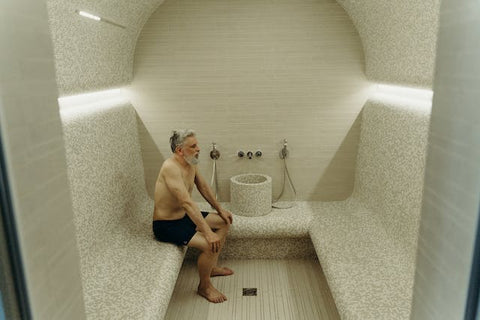What are the Benefits of a Sauna? Science Answers!
Understanding Sauna: What is The Purpose of a Sauna and Brain Health Benefits
Stepping into a small wooden room heated to between 150-212 degrees Fahrenheit may not sound appealing, but doing so can provide many health benefits. This practice is known as sauna bathing, and it has been a tradition in Nordic countries and cultures around the world for hundreds of years. From social gathering places to healing rituals, saunas have long served many culturally significant purposes.
For those curious about what exactly saunas do, if they live up to the hype around their health benefits, and what the experience is really like, reading on will uncover the meaningful impact these seemingly simple hot rooms can have. By evaluating both the subjective pleasures and scientifically-backed physical effects, the restorative and healing power of saunas becomes clear.
The Evolution and Significance of Saunas

The sauna has undergone a remarkable evolution over the years, transforming from a simple bathhouse into a modern health and wellness facility recognized globally for its myriad benefits. Saunas have been part of human culture for centuries, originating in regions like Scandinavia and Eastern Europe. Over time, the concept of the sauna has spread worldwide, adapting to varying cultural contexts while retaining its core essence: a place for warmth, relaxation, and rejuvenation.
The traditional practice of sauna bathing involves spending time in a room heated to high temperatures, allowing for profound sweating and relaxation. This practice has been sustained and evolved, with modern variations such as infrared saunas offering a different approach to therapy heat. Special infrared light waves, in particular, use light waves to create heat, providing a gentler sauna experience that has expanded its appeal to a broader audience.
Regular sauna use's health advantages are well supported by extensive documentation and an increasing amount of scientific evidence. Prospective cohort studies have highlighted the numerous advantages associated with using a sauna, ranging from cardiovascular improvements to mental well-being enhancements. One of the significant findings from such studies is that sauna users reduce the risk of certain health conditions, making it an effective tool for preventive health care.
Regular bathing in saunas has been linked to various similar health benefits, including improved circulation, detoxification, and relaxation. These health benefits of sauna use are not confined to physical well-being alone; sauna use has also been shown to have a positive impact on mental and emotional wellness. The heat experienced in a sauna can induce a state of relaxation that alleviates stress and improves the overall mood.
The evolution of saunas from traditional steam baths to modern infrared rooms reflects a broader trend in health and wellness—a shift towards natural, holistic practices that promote overall well-being. The sauna has emerged as a sanctuary where one can escape the hustle of daily life, relax deeply, and emerge rejuvenated. It’s a practice that harmoniously blends ancient tradition with modern health insights, offering a unique approach to wellness that is as effective as it is enjoyable.
Related: The History of Sauna
Saunas in Eastern Finland: A Deep-Rooted Tradition

In Eastern Finland, saunas, especially traditional Finnish saunas, are not just wellness and recreational facilities but are deeply ingrained in the cultural fabric. These dry saunas, with their unique method of heat generation and the best sauna temperature, play a crucial role in local lifestyle and wellness practices.
The Contrast of Traditional and Infrared Saunas
While traditional saunas rely on burning wood to create dry heat, modern infrared saunas use special light waves to produce a unique heating experience. These modern saunas have gained popularity for their ability to provide intense heat at lower temperatures.
Saunas in Eastern Finland: A Deep-Rooted Tradition
In Eastern Finland, saunas, especially traditional Finnish saunas, are not just wellness facilities but are deeply ingrained in the cultural fabric. These saunas, with their unique method of heat generation, like the use of heated rocks, play a crucial role in local lifestyle and wellness practices.
The Therapeutic Nature of Sauna Bathing

The therapeutic nature of sauna bathing has been a topic of interest and study for many years, revealing significant benefits for various health conditions. Sauna bathing, with its serene and warm environment, has been shown to play a crucial role in enhancing overall well-being and wellness. It particularly stands out for its impact on cardiovascular health and mental well-being. The heat experienced during bathing in a sauna initiates a series of physiological changes that contribute to the body's overall fitness.
One of the most notable benefits of regular sauna bathing is its potential to reduce the incidence of sudden cardiac death. The gentle and consistent heat exposure helps in conditioning the heart and blood vessels, enhancing cardiovascular resilience. This aspect of sauna therapy is especially beneficial for individuals with heart conditions like unstable angina pectoris, where maintaining heart health is paramount. The warmth and relaxation provided by bathing in sauna can aid in managing symptoms and improving overall heart function.
Furthermore, regular dry sauna bathing has been linked to a reduced risk of cognitive decline, particularly Alzheimer's disease. Prospective cohort studies have suggested that the regular use of saunas may have a protective effect on brain health, potentially slowing the progression of cognitive disorders. This correlation underscores the importance of sauna bathing not just for physical energy but also for maintaining cognitive functions.
Sauna Bathing and Internal Organ Health
-
Improving Cardiovascular Function
Regular sauna bathing has a profound effect on the cardiovascular and immune system. The heat of the sauna stimulates the blood vessels, enhancing circulation and promoting heart health. This improved circulation benefits internal organs by ensuring efficient nutrient and oxygen delivery throughout the body.
Stress Reduction through Sauna Use
-
Mental Relaxation and Clarity
One of the most immediate benefits of sauna bathing is stress reduction. The warm, quiet environment of a sauna offers a sanctuary from the stressors of daily life, allowing the mind to relax and rejuvenate. This mental relaxation can have a positive impact on overall cognitive functioning, potentially aiding in the management of neurocognitive disease. -
Hormonal Balance
Sauna use can influence the balance of stress hormones in the body, such as cortisol. By reducing the level of stress hormones, regular sauna bathing can contribute to a more relaxed and balanced state of mind, enhancing overall mental wellness.
Sauna Bathing in Managing Medical Conditions
-
Cardiovascular Diseases and Sauna Use
For individuals with certain cardiovascular conditions, such as those recovering from heart attacks, sauna bathing should be approached with caution. While the heat can be beneficial for heart health, it’s important to consult with a healthcare professional to determine the appropriateness and safe practices of sauna use in such cases. -
Neurocognitive Disease Management
Emerging research suggests that regular sauna use might have benefits for neurocognitive diseases. The relaxation and improved circulation associated with sauna bathing could potentially have positive effects on brain health, although more research is needed in this area.
Sauna Bathing and Blood Pressure
-
Effects on High and Low Blood Pressure
Steam rooms can have different effects on blood pressure. For individuals with high blood pressure, sauna use can lead to temporary reductions in blood pressure due to vasodilation. Conversely, for those with low blood pressure, it's important to use steam saunas cautiously and potentially under medical advice, as the heat might cause further drops in blood pressure.
The Importance of Regular Sauna Bathing
-
Consistency for Maximum Benefits
To fully reap the therapeutic benefits of steam sauna bathing, regularity is key. Consistent bathing in sauna can amplify the positive effects on mental and physical energy, contributing to long-term well-being.
Sauna Bathing and Its Effect on Heart Rate
-
Cardiovascular Stimulation Similar to Light Exercise
The heat in a steam room causes the heart rate to increase, similar to the effect of light exercise. This cardiovascular workout, albeit less strenuous, can contribute to improved heart health and circulation.
Sauna Use in Relation to Public Health
-
Addressing Widespread Health Issues
In the context of public health, sauna bathing can play a role in addressing widespread health issues such as stress, hypertension, and certain chronic conditions. By offering a natural and accessible means of relaxation and cardiovascular stimulation, saunas can contribute to the overall health of a community. -
Preventive Healthcare Approach
Sauna use aligns with the preventive healthcare approach, encouraging regular self-care practices to maintain well-being and prevent illness. This proactive approach to health can lead to reduced healthcare costs and improved public health outcomes.
Relative Humidity in Saunas and Its Health Implications
-
Enhancing the Sauna Experience
The relative humidity in a sauna can significantly impact the overall experience and health benefits. Higher relative humidity levels can intensify the perceived heat, leading to more profuse sweating and a deeper sense of relaxation. -
Adapting to Individual Health Needs
The level of humidity in a sauna can be adjusted to suit individual preferences and well-being needs. Those with certain respiratory conditions might prefer lower humidity for comfort, while others may find higher humidity body temperature levels more therapeutic.
Sauna Bathing for Various Medical Conditions
Sauna bathing can serve as a complementary practice for managing various medical conditions. While it is not a cure, the heat and relaxation provided by a sauna can aid in symptom management and overall well-being for conditions like chronic pain, arthritis, and certain other cardiovascular disease issues.
The incorporation of heat packs in sauna sessions can enhance the therapeutic effects, providing localized therapy in heat that complements the overall sauna experience. This additional, heat pack application can be particularly beneficial for targeting specific areas of discomfort or muscle tension.
Related: Sauna for Muscle Recovery
Comprehensive Health Benefits of Regular Sauna Use

The practice of using saunas regularly, a tradition rooted in numerous cultures, has gained global recognition for its many health benefits. Sauna bathing, a process that encapsulates both the tranquility of a relaxing environment and the therapeutic impact of heat, has been the subject of various scientific inquiries, including prospective cohort studies. These studies have illuminated the diverse ways in which sauna use can positively affect overall health and well-being.
One of the key benefits of regular use of a sauna is its efficacy in managing the pressure in your blood. Individuals with conditions like uncontrolled hypertension and incident hypertension have been observed to experience positive changes through consistent sauna. The heat in a sauna, often enhanced with heat packs for targeted relief, promotes vasodilation—the widening of blood vessels—which can lead to a reduction in blood pressure levels. This effect contributes significantly to cardiovascular health, making bathing in a sauna a valuable practice for those managing hypertension.
Moreover, a few minutes a day of bathing in saunas extends beyond physical health improvements. The benefits of sauna bathing affect the body and mind in a holistic manner, offering a refuge where one can unwind and release stress. The cumulative benefits of this practice of spending a few minutes in the sauna are not just limited to immediate relaxation but also contribute to long-term health enhancements. Regular bathing in saunas often results in an overall improvement in their quality of life, highlighting the comprehensive nature of the health benefits associated with sauna bathing.
Sauna Use and Its Impact on Brain Health
Regular sauna use has a significant impact on brain health, with studies suggesting a reduction in the risk of neurocognitive diseases like Alzheimer's due to improved blood flow and oxygenation to the brain.
Cardiovascular Health Benefits from Sauna Bathing
Regular sauna bathing is associated with improved cardiovascular health, reducing risks of heart disease and heart failure, and aiding in managing conditions like high blood pressure.
Sauna Sessions and Blood Pressure Management
Sauna sessions offer a natural way to help regulate blood pressure. The heat from sauna use dilates blood vessels, temporarily lowering blood pressure, which is beneficial for those with hypertension.
Addressing Neurocognitive Disorders with Sauna Bathing
Studies, including prospective cohort studies, have shown that regular sauna use can potentially lower the risk of neurocognitive disorders such as Alzheimer's disease, offering a promising approach to brain health.
Saunas and Rheumatoid Arthritis Relief
Individuals suffering from rheumatoid arthritis may find relief in regular sauna sessions. The heat helps reduce joint stiffness and muscle soreness, contributing to pain management.
The Impact of Sauna Bathing on Skin Health
Sauna bathing can improve skin conditions by promoting sweating, which helps cleanse the skin and remove impurities. This can lead to healthier, more radiant skin.
Sauna Effect on Muscle Recovery and Pain Relief
The heat from bathing in a sauna is effective in relaxing muscle tissue, reducing soreness, and aiding in faster recovery post-exercise. This makes it a favored option for athletes and those engaged in regular physical activity.
Stress Reduction and Mental Relaxation
One of the most immediate and noticeable effects of saunas is their ability to reduce stress. The warm, soothing environment of a sauna helps calm the mind, relieving mental tension and promoting relaxation. This stress reduction is not only beneficial for immediate mental well-being but also contributes to long-term similar health benefits.
Improved Mental Clarity and Well-being
Regular bathing in saunas often results in improved mental clarity and an overall sense of well-being. The relaxation and detoxification process that occurs during a bathing sauna can have a positive effect on cognitive function.
Mental and Physical Health Benefits of Sauna Use

The practice of sauna bathing has long been cherished for its profound health benefits, a tradition that has evolved into an essential element of modern wellness regimens. With the advent of various types of saunas, including the increasingly popular infrared sauna, the scope of these benefits has broadened significantly. Sauna bathing, known for its relaxing environment and therapeutic heat exposure, has been the subject of numerous studies, including prospective cohort studies, which have illuminated the extensive health advantages it offers.
The combined effect of wet heat in traditional saunas and the targeted warmth of infrared sauna contributes to a range of physical and mental health improvements. The wet heat of exposure, whether from the steamy embrace of a traditional sauna or the penetrating rays of an infrared sauna, aids in relaxing the body and mind. This relaxation is not just superficial; it extends to the body’s ability to heal and rejuvenate itself. Regular bathing in saunas has been linked with a reduction in all-cause mortality, a testament to its comprehensive well-being benefits.
-
The Role of Saunas in Mental Health and Stress Reduction
Saunas provide a relaxing environment that significantly contributes to stress reduction. The calming effect of regular bathing in the sauna improves overall mental well-being. -
Physical Health Advancements Through Sauna Use
Regular sauna sessions aid in alleviating muscle soreness, promoting physical activity, and enhancing cardiorespiratory fitness, thus contributing to overall physical energy. -
Skin Health and Sauna Bathing
One of the benefits of a sauna is its positive impact on the skin. The sweating process helps cleanse the skin and may alleviate certain skin conditions. -
Cardiovascular Health and Blood Pressure Management
Regular sauna use has been linked to improved cardiovascular health. The heat from a sauna can help dilate blood vessels, improve circulation, and potentially lower blood pressure. This is particularly beneficial for individuals with high blood pressure. -
Sauna Bathing Reduces Risk of Cardiovascular Disease
Studies have indicated that regular sauna use can reduce the risk of cardiovascular disease. The heat therapy provided in a sauna session helps in maintaining heart health and can lead to a reduced risk of conditions such as hypertension and heart disease. -
Improvement in Blood Circulation
Improved blood circulation is another significant benefit of sauna bathing. The heat exposure helps to increase blood flow throughout the body, which can improve overall cardiovascular function and contribute to better well-being. -
Reduction in High Blood Pressure
For those suffering from high blood pressure, a regular sauna can be a natural remedy. The heat helps in the dilation of blood vessels, which can lead to a temporary decrease in blood pressure levels. Over time, this can contribute to overall low blood pressure under management. -
Detoxification and Skin Health
Sauna bathing aids in detoxification, as sweating helps to flush toxins from the body. This process not only benefits internal health but also contributes to healthier skin by clearing pores and potentially improving various skin conditions. -
Muscle Relaxation and Pain Relief
The heat in a sauna can relax muscles, reducing muscle soreness and tension. This is particularly beneficial after physical activity, as it can aid in muscle recovery and reduce pain.
Understanding the Risks and Practicing Caution

The use of private saunas, a practice steeped in history, has transcended its traditional roots to become a valued part of modern wellness routines, largely due to its significant mental and physical health benefits. Sauna bathing has been acknowledged for its ability to induce deep relaxation in a soothing environment, thereby reducing stress and promoting overall well-being. Offer a unique experience as they emit light waves that penetrate the skin, providing warmth without the extreme heat of traditional saunas.
Studies, including prospective cohort studies, have highlighted that regular sauna use is associated with a plethora of health benefits. These include a strengthened immune system, a reduced risk of incidents like hypertension, and possibly even a decreased risk of all-cause mortality rates. Furthermore, the therapeutic heat of sauna bathing has been shown to reduce the risk of several health conditions, underscoring the extensive health benefits of sauna use. However, as with any wellness practice, understanding the biggest risks, such as the need to stay hydrated, is crucial to maximizing the benefits of saunas while ensuring safety and optimal well-being.
-
Sauna Use Among Individuals with Cardiovascular Conditions
Those with cardiovascular conditions such as heart disease or heart failure should exercise caution and consult healthcare providers before engaging in a dry sauna. -
Sauna Use in Physical Activity and Fitness
Incorporating saunas into a physical fitness routine can enhance overall cardiorespiratory fitness. It complements physical activity by aiding in muscle recovery and improving circulation. -
Managing Muscle Pain and Chronic Conditions
While sauna use can be beneficial for muscle pain and chronic conditions like chronic bronchitis, it's important to understand the body's ability to cope with the heat. Heat therapy should be used as a complementary treatment, not a replacement for medical care. -
Sauna Bathing and Harvard Health Publishing Recommendations
Sources like Harvard Health Publishing offer insights into the safe use of saunas. They emphasize the importance of understanding personal health conditions and consulting healthcare providers for tailored advice on sauna use. -
Sauna Use in Light of Prospective Cohort Studies
Prospective cohort studies have shed light on the long-term effects of regular sauna bathing. These studies help in understanding the risks and benefits of sauna affects, especially in relation to chronic health conditions and overall mortality. -
Adjusting Sauna Practices for Health Conditions
Sauna bathers with health issues should adjust their sauna practices accordingly. This might include reducing the duration of each sauna session, lowering the core temperature, or increasing hydration before and after sauna use. -
The Role of Heat Packs and Hot Water Immersion
Incorporating heat packs or hot water immersion in a sauna can intensify the heat effect. Users should be aware of their tolerance and medical advisories, especially those with blood pressure issues. -
Monitoring Core Body Temperature and Heart Rate
Monitoring body temperature and heart rate during a sauna can help avoid overheating and cardiac strain. Users should be attentive to their body's responses and exit the sauna if they experience discomfort or warning signs. -
Sauna Use and Medical Conditions
Individuals with medical conditions, especially those related to cardiovascular health, should know how to use a sauna properly and with caution. For those with a history of heart attacks or chronic conditions like rheumatoid arthritis, personalized advice from a healthcare professional is essential. -
Enhancing Cardiovascular Health Through Sauna Bathing
The benefits of sauna bathing, particularly in terms of cardiovascular health, have been extensively documented in various prospective cohort studies. These studies have consistently shown that regular sessions in a sauna, characterized by dry heat, can lead to significant improvements in heart function and circulation. Sauna bathers benefit from the gentle yet effective cardiovascular workout that the heat provides, which is akin to the same benefits of moderate physical exercise. This process of heating the body and then allowing it to cool down has been shown to reduce the incidence of cardiovascular diseases. In fact, regular sauna bathing reduces the risk factors associated with heart diseases, making it an excellent practice for those looking to improve their cardiovascular health. -
Stress Relief and Relaxation with Sauna Bathing
Sauna bathing is not just beneficial for physical health; it also offers substantial mental relaxation and stress relief. The tranquil environment of a sauna, combined with the warmth of dry heat, provides a perfect setting for mental unwinding. This environment allows users of saunas and bathers to detach from daily stresses and immerse themselves in a state of deep relaxation. Moreover, the application of heat packs during sessions in saunas can enhance this experience, providing localized therapy in heat that further aids in relaxation and stress reduction. You can use a sauna to manage stress in this fast-paced world. -
Long-Term Health Benefits and Preventive Care in Sauna Bathing
The long-term health benefits of sauna bathing have been a subject of interest in many prospective cohort studies. These studies suggest that consistent sauna bathing can contribute significantly to overall longevity and wellness. The dry heat of a sauna provides a holistic health experience, promoting detoxification and relaxation, which in turn contributes to better health over time. Regular bathing in saunas often results in an overall improvement in their well-being, underscoring the preventive care aspect of bathing in saunas. This regular exposure to heat not only enhances immediate relaxation but also contributes to long-term potential health benefits, making sauna bathing a valuable practice for preventive healthcare and wellness.
Related: Can Infrared Saunas Cause Cancer
In Summary
The exploration of saunas reveals a fascinating intersection of tradition, wellness, and neurological health. The primary purpose of a sauna, deeply rooted in various cultures, extends beyond mere relaxation and into the realm of significant health benefits. Notably, the impact on brain health is an area of growing interest and research. Regular sauna use has been associated with enhanced cognitive function and a reduced risk of neurodegenerative diseases.
Moreover, sitting in a sauna, through its heat stress, is shown to potentially foster neurogenesis, enhancing our ability to manage stress and bolstering mental well-being. Ultimately, as we continue to uncover the layers of sauna benefits, it becomes evident that this ancient practice offers not just a retreat for the body but also a sanctuary for the mind. This underscores a holistic approach to health that is both timeless and scientifically valid.
Shop today
